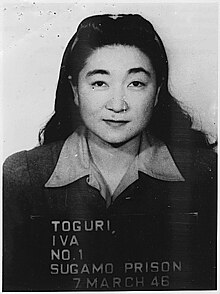Iva Toguri D'Aquino | |
|---|---|
戸栗郁子 アイバ | |
 | |
| Born | Iva Ikuko Toguri July 4, 1916 Los Angeles, California, U.S. |
| Died | September 26, 2006 (aged 90) Chicago, Illinois, U.S. |
| Resting place | Montrose Cemetery, Chicago, Illinois |
| Other names | Orphan Annie Tokyo Rose Ann |
| Education | University of California, Los Angeles (BS) |
| Occupation(s) | Disc jockey, radio personality, broadcaster, typist, merchant |
| Years active | 1943–1945 |
| Employers | Japanese central government's news agency and Radio Tokyo |
| Known for | Participating in English-language radio broadcasts transmitted by Radio Tokyo |
| Spouse |
Felipe D'Aquino
(m. 1945; div. 1980) |
| Children | 1 (Birth not allowed in U.S., died) |
Iva Ikuko Toguri D'Aquino (Japanese: 戸栗郁子 アイバ; July 4, 1916 – September 26, 2006) was an American disc jockey and radio personality who participated in English-language radio broadcasts transmitted by Radio Tokyo to Allied troops in the South Pacific during World War II on the Zero Hour radio show. Toguri called herself "Orphan Annie", but she quickly became inaccurately identified with the name "Tokyo Rose", coined by Allied soldiers and which predated her broadcasts.
After the surrender of Japan, Toguri was detained for a year by the United States military for possible wrongdoing against the U.S. but was released for lack of evidence and U.S. Department of Justice officials agreed that her broadcasts were "innocuous".
However, when Toguri tried to return to the U.S. a popular uproar ensued, prompting the Federal Bureau of Investigation to renew its investigation of her wartime activities. She was subsequently charged by the U.S. Attorney's Office with eight counts of treason. Her 1949 trial resulted in a conviction on one count, for which she served more than six years, out of a ten-year sentence in prison.
Journalistic and governmental investigators years later pieced together the history of irregularities with the indictment, trial, and conviction, including confessions from key witnesses who had perjured themselves at the various stages of their testimonies. Toguri received a pardon from President Gerald Ford in 1977.